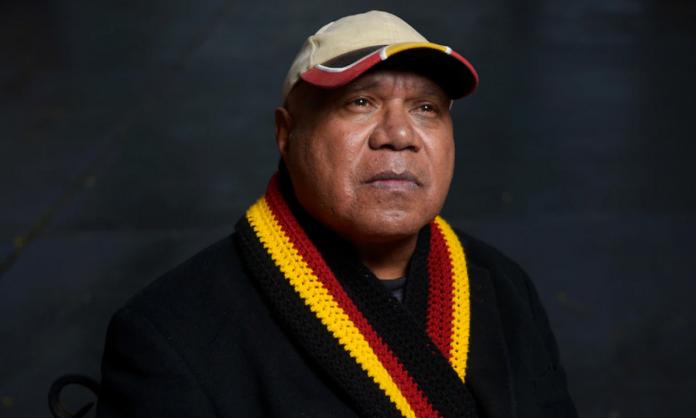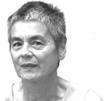Archie Roach’s sons, Amos and Eban, have given permission for their father’s name and image to be used “so that his legacy will continue to inspire”.
Archie Roach, Gunditjmara and Bundjalung elder, tragically died on 30 July, aged only 66. We have lost a peerless artist and fighter for justice. Uncle Archie, as he was affectionately known, was not only a sublime singer-songwriter whose performances could and did move you to tears; he was also a poet and author who powerfully and articulately expressed the pain and loss resulting from Indigenous oppression. But along with the pain there were also messages of courage, solidarity, resilience and hope.
The saturation media coverage and the many tributes that poured in from all round the world are testament to Archie’s deep and lasting impact. As Jill Gallagher of the Victorian Aboriginal Community Controlled Health Organisation said: “He made the world stand up and listen”. Billy Bragg noted that his death was a loss “to all of us who believe that music can be used as a tool to seek justice”. Paul Kelly put it simply and succinctly: “Big tree down. Weeping in the forest”.
In 1990, Kelly booked Archie to open for him at the Melbourne Concert Hall, his biggest gig to that point. Archie played just two songs, the second of which was to become known as his signature song, “Took the Children Away”—the story of his own harrowing experience as a member of the Stolen Generations. “When the song finished, there was dead silence”, Kelly later recalled. “[Archie] thought that he bombed and just turned and walked off stage. [But] as he was walking off, the applause started to build and build. The audience had been so stunned that it had taken them a while to respond.” “Took the Children Away” would later win an international Human Rights Achievement Award, the first song ever to do so.
Shortly after, Kelly produced Archie’s first album, Charcoal Lane, full of songs of searing honesty, their effect heightened by his glorious voice. It won him two ARIAs—the first of many awards and accolades.
But Archie’s success came after a long period of trauma and hardship. At a very young age, along with his siblings, he was forcibly taken from his parents at the Framlingham Aboriginal Mission in south-west Victoria. Snatched from our mother’s breast/ Said this was for the best/ Took us away. Separated from his siblings, he was placed first in an orphanage and then in a series of foster homes. Then they split us up again/... Sent us off to the foster homes/ As we grew up, we felt alone/ ’Cause we were acting white and feeling black ...
Archie had a period of relative stability in his third foster home, with the Cox family, Scottish immigrants from whom he acquired a love of music. But when he was 14, out of the blue, he received a letter from his sister Myrtle, informing him that their mother had recently died and their father was already dead. This came as a huge shock to Archie, who had falsely been told his family had died in a fire. (It was the cruel common practice for stolen children to be told that their parents had died or abandoned them, to prevent attempts at reunification.) Archie’s world, he later said, “started to spin”, his childhood now appearing to him as an empty lie. Not long after, aged 15, he fled the foster home and never saw the Coxes again.
With vague intentions of finding his family, Archie hit the road. He spent the next few years as a homeless itinerant, frequently being arrested and jailed for begging and vagrancy. Not surprisingly, he began drinking to dull the pain.
Down city streets I would roam, I had no bed, I had no home/ There was nothing that I owned, used my fingers as a comb/ In those days when I was young, drinking and fighting was no fun/ It was daily living for me, I had no choice. It was meant to be ... (“Down City Streets”, from Charcoal Lane, written by Ruby Hunter).
At various points in this period he managed to find his sisters Diana, Alma and Myrtle and his brother Lawrence, and learned that another sister, Gladys, had died in a car accident.
Still in his teens, Archie was wrongly arrested for car theft and sentenced to a year in prison. Released after six months, he hitchhiked to Adelaide. It was there he met the love of his life, Ruby Hunter, herself a stolen child from the Ngarrindjeri people and a gifted musician. They had two sons, and later fostered other children, motivated by the desire to provide the loving family and security they had both lacked.
For some time, Archie continued to struggle with alcoholism and mental health issues, spending time in hospitals and rehab and on one occasion attempting suicide. Eventually he was able to turn things around; supported by Ruby, he became a rehab counsellor and began writing songs. He sang “Took the Children Away” at a protest against the bicentennial celebrations in 1988, a performance that brought him to Paul Kelly’s attention. At first reluctant to record, Archie was persuaded by Ruby, who said: “When one of us shines, we all shine”. The rest is history.
Archie and Ruby co-founded Black Arm Band, a collective of Indigenous artists with a focus on protest songs. Their own songs highlighted various aspects of Indigenous oppression. “Song for Elijah” and “Lighthouse”, for example, are elegies for young Indigenous men who died violent deaths due to racism. In a 1992 interview, Archie explained: “I don’t want to see my people destroyed anymore”.
Ruby died suddenly in 2010, and Archie was shattered, himself suffering a seizure and then a stroke. But he sang at Ruby’s funeral and went on performing and speaking out for his people, as she would have wished. In 2013, shortly after receiving a Lifetime Deadly Award, Archie called on then Prime Minister Tony Abbott to end the Northern Territory Intervention, a call that unsurprisingly fell on deaf ears. In 2014, he set up a foundation to help incarcerated Indigenous people turn their lives around.
Even after having surgery for lung cancer and needing oxygen to take to the stage, Archie continued performing. In February this year, together with Paul Grabowsky and the Melbourne Symphony Orchestra, Archie did a concert at the Myer Music Bowl, attended by more than 6,000. Grabowsky described it as “a performance for the ages ... he flew like an eagle, and sang up the land”, his voice “gravelled with age and yet sweet as dark honey”.
I was fortunate to meet Archie once. It was late 1997, and Bringing them home, the report that exposed the horror and cruelty of the Stolen Generations, had been published earlier that year. Sandra Bloodworth and I were writing a pamphlet on the issue, Genocide, the Australian Way. That day, I was selling Socialist Alternative magazine (predecessor of Red Flag) in the Bourke St Mall. Archie stopped to sign our petition, and I asked him for permission to use the lyrics of “Took the Children Away” as a preface. With a smile that lit up his face, he immediately agreed.
Politicians have been effusive in their praise for Archie. But unless and until they do something meaningful to address the ongoing dispossession, Black deaths in custody, the appalling incarceration rates, the theft of children and all the other issues that blight Indigenous lives, their words will ring hollow. The rest of us can best honour Archie’s memory by continuing to fight racism and for justice for Indigenous people.









